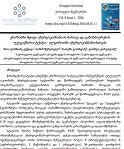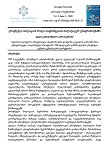Russia's South Caucasus Policy In The Context Of Geopolitical Interests
Downloads
At the onset of the 21st century, a shift in ruling power within Russia prompted a noticeable transition in the theoretical underpinnings of the state's foreign policy—from Westernism to neo-Eurasian ideologies. This article delves into the evolving geopolitical landscape following the Cold War across the former USSR, highlighting the intersecting interests of Russia with both international and regional stakeholders in the South Caucasus. Examining the historical backdrop of geopolitical rivalries in the region alongside pertinent political and economic dimensions, the piece scrutinizes Russia's South Caucasus policy and its theoretical framework, rooted in Defensive and later Offensive realism. Furthermore, it probes into the drivers behind Russia's assertive stance in its South Caucasus policy, analyzing the methods and strategies employed to combat contemporary security threats while unraveling Russia's geopolitical ambitions in the region. The main conclusion of the article is that Russia, which considers the South Caucasus as a vitally important region, tries to maintain its presence in the region in order to secure its geopolitical interests, and creates obstacles for the strengthening of other actors in this region.
Downloads
Məlikova, Z.(2017) Şərqi Avropa: müasir inkişafın və təhlükəsizliyin mexanizmləri. Bakı: “Elm və təhsil” nəşriyyatı, 224 s.
Военная доктрина Российской Федерации. https://docs.cntd.ru/document/420246589 (28.12.2023)
Концепция внешней политики России 2023: стратегия многополярного мира. https://russiancouncil.ru/analytics-and-comments/analytics/kontseptsiya-vneshney-politiki-rossii-2023-strategiya-mnogopolyarnogo-mira/ (14.02.2024)
Концепция внешней политики Российской Федерации (утверждена Президентом Российской Федерации В.В.Путиным 31 марта 2023 г.) https://www.mid.ru/ru/detail-material-page/1860586/ (08.11.2023)
Список российских военных объектов за рубежом. https://ru.wikipedia.org/wiki (17.01.2024)
РФ приостановила эксплуатацию Габалинской РЛС — МИД Азербайджана. http://news.mail.ru/politics/11254053/?frommail=1 (23.01.2024)
Copyright (c) 2024 Georgian Scientists

This work is licensed under a Creative Commons Attribution-NonCommercial-NoDerivatives 4.0 International License.


























































































































































































































